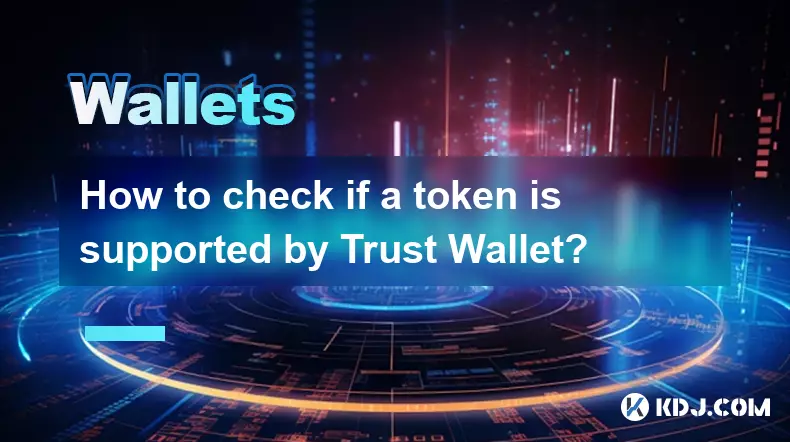-
 bitcoin
bitcoin $123963.239194 USD
1.37% -
 ethereum
ethereum $4529.082464 USD
1.07% -
 xrp
xrp $2.983640 USD
0.71% -
 tether
tether $1.000287 USD
0.02% -
 bnb
bnb $1179.874393 USD
2.99% -
 solana
solana $230.633678 USD
1.55% -
 usd-coin
usd-coin $0.999835 USD
0.03% -
 dogecoin
dogecoin $0.254240 USD
1.34% -
 tron
tron $0.341176 USD
0.15% -
 cardano
cardano $0.842285 USD
0.52% -
 hyperliquid
hyperliquid $48.537896 USD
-0.86% -
 chainlink
chainlink $21.863092 USD
-0.84% -
 ethena-usde
ethena-usde $0.999743 USD
-0.07% -
 sui
sui $3.579561 USD
-0.18% -
 stellar
stellar $0.403418 USD
2.67%
Is it safe to store my funds in Trust Wallet?
Trust Wallet’s non-custodial design ensures you control your keys, but security depends on safeguarding your device and never sharing your 12-word recovery phrase.
Oct 06, 2025 at 05:36 am

Understanding Trust Wallet’s Security Model
1. Trust Wallet operates as a non-custodial wallet, meaning users maintain full control over their private keys. These keys are stored locally on the user's device and are never transmitted to external servers. This design significantly reduces the risk of centralized breaches.
2. The wallet does not require account registration or personal information, which enhances privacy. Without identifiable data tied to the wallet, attackers have fewer entry points for social engineering or identity-based exploits.
3. End-to-end encryption protects sensitive data during backup and restore processes, ensuring that even if a device is compromised, the recovery phrase remains secure when properly safeguarded by the user.Risks Associated with Mobile Wallets
1. Despite its robust architecture, Trust Wallet runs on consumer-grade mobile devices, which can be vulnerable to malware, phishing apps, or physical theft. If a malicious actor gains access to the device, they may exploit clipboard hijacking to alter cryptocurrency addresses during transactions.
2. Users who store their recovery phrase digitally—such as in notes, screenshots, or cloud storage—are exposed to higher risks. A compromised phone or synced account could lead to irreversible fund loss.
3. Public Wi-Fi networks pose an additional threat. Conducting transactions over unsecured connections increases the likelihood of man-in-the-middle attacks, where transaction details might be intercepted or altered.Best Practices for Securing Your Trust Wallet
1. Always download Trust Wallet from official app stores or the verified website. Third-party sources often distribute modified versions embedded with spyware or fake interfaces designed to steal credentials.
2. Enable biometric authentication (fingerprint or face recognition) within the app settings. This adds a layer of protection that prevents unauthorized access even if the device is unlocked.
3. Store your 12-word recovery phrase offline—preferably on metal or paper—and never share it with anyone. Avoid taking photos or saving it in digital formats accessible via internet-connected devices.4. Regularly update both the Trust Wallet application and your mobile operating system. Updates frequently include security patches that address known vulnerabilities exploited by emerging threats.
Frequently Asked Questions
Can someone hack my Trust Wallet remotely?
No one can directly hack into your Trust Wallet remotely if you follow proper security measures. Since private keys are stored only on your device and the wallet is non-custodial, remote access requires either physical possession of your device or knowledge of your recovery phrase.
What happens if I lose my phone with Trust Wallet installed?
If you lose your phone, your funds remain safe as long as your recovery phrase is secure. You can reinstall Trust Wallet on a new device and restore access using the 12-word backup. Never store the phrase on the same device.
Does Trust Wallet freeze or lock user funds?
Trust Wallet has no mechanism to freeze or lock funds. Being a decentralized wallet, all transaction authority lies solely with the user through their private key. No third party can restrict access or reverse transactions.
Disclaimer:info@kdj.com
The information provided is not trading advice. kdj.com does not assume any responsibility for any investments made based on the information provided in this article. Cryptocurrencies are highly volatile and it is highly recommended that you invest with caution after thorough research!
If you believe that the content used on this website infringes your copyright, please contact us immediately (info@kdj.com) and we will delete it promptly.
- BlockDAG, DOGE, HYPE Sponsorship: Crypto Trends Shaping 2025
- 2025-10-01 00:25:13
- Deutsche Börse and Circle: A StableCoin Adoption Powerhouse in Europe
- 2025-10-01 00:25:13
- BlockDAG's Presale Buzz: Is It the Crypto to Watch in October 2025?
- 2025-10-01 00:30:13
- Bitcoin, Crypto, and IQ: When Genius Meets Digital Gold?
- 2025-10-01 00:30:13
- Stablecoins, American Innovation, and Wallet Tokens: The Next Frontier
- 2025-10-01 00:35:12
- NBU, Coins, and Crypto in Ukraine: A New Yorker's Take
- 2025-10-01 00:45:14
Related knowledge

How to find my BEP20 address on Trust Wallet?
Oct 04,2025 at 06:19pm
Understanding BEP20 and Trust Wallet Compatibility1. Trust Wallet is a widely used cryptocurrency wallet that supports multiple blockchain networks, i...

How to sync my Trust Wallet with the browser extension?
Oct 03,2025 at 06:19pm
Understanding Trust Wallet and Browser Extension IntegrationTrust Wallet is a popular non-custodial cryptocurrency wallet that supports a wide range o...

How to check if a token is supported by Trust Wallet?
Oct 04,2025 at 05:18am
Understanding Token Compatibility with Trust Wallet1. Trust Wallet supports a wide range of blockchain networks, including Ethereum, Binance Smart Cha...

How to get the Trust Wallet browser extension?
Oct 01,2025 at 12:37am
How to Access the Trust Wallet Browser Extension1. Visit the official Trust Wallet website through a secure internet connection. Navigate to the downl...

How to interact with a DApp using Trust Wallet?
Oct 02,2025 at 10:00pm
Connecting Trust Wallet to a DApp1. Open the Trust Wallet app on your mobile device and ensure your wallet is unlocked with access to your assets. Nav...

How to scan a QR code with Trust Wallet?
Oct 02,2025 at 03:37pm
Understanding QR Codes in Trust Wallet1. QR codes are widely used in cryptocurrency applications to simplify transaction processes. Trust Wallet lever...

How to find my BEP20 address on Trust Wallet?
Oct 04,2025 at 06:19pm
Understanding BEP20 and Trust Wallet Compatibility1. Trust Wallet is a widely used cryptocurrency wallet that supports multiple blockchain networks, i...

How to sync my Trust Wallet with the browser extension?
Oct 03,2025 at 06:19pm
Understanding Trust Wallet and Browser Extension IntegrationTrust Wallet is a popular non-custodial cryptocurrency wallet that supports a wide range o...

How to check if a token is supported by Trust Wallet?
Oct 04,2025 at 05:18am
Understanding Token Compatibility with Trust Wallet1. Trust Wallet supports a wide range of blockchain networks, including Ethereum, Binance Smart Cha...

How to get the Trust Wallet browser extension?
Oct 01,2025 at 12:37am
How to Access the Trust Wallet Browser Extension1. Visit the official Trust Wallet website through a secure internet connection. Navigate to the downl...

How to interact with a DApp using Trust Wallet?
Oct 02,2025 at 10:00pm
Connecting Trust Wallet to a DApp1. Open the Trust Wallet app on your mobile device and ensure your wallet is unlocked with access to your assets. Nav...

How to scan a QR code with Trust Wallet?
Oct 02,2025 at 03:37pm
Understanding QR Codes in Trust Wallet1. QR codes are widely used in cryptocurrency applications to simplify transaction processes. Trust Wallet lever...
See all articles










































































